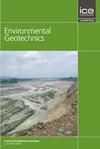Numerical Modelling Techniques for Stability Analysis of Slopes Reinforced with Shallow Roots
IF 2.2
4区 工程技术
Q3 ENGINEERING, GEOLOGICAL
引用次数: 1
Abstract
It is well recognised that plant vegetation and roots are capable of improving the shear strength of hillslopes by reinforcing soil shear resistance. Several key factors influencing the level of slope reinforcement include root geometry, orientation and strength. To assess the mechanical performance of vegetated slopes using numerical methods, root structures can be represented by beam and pile elements to mirror root behaviour. In contrast, root reinforcement can be modelled indirectly through a root cohesion factor, supplying additional strength to the soil surrounding the root zone. In this paper, correlations between these two numerical methods are presented, highlighting the applicability of each technique based on various root characteristics. Three types of root geometries are presented, consisting of a primary tap root, a secondary cohesion zone surrounding the main root and a root branching process. The results of the finite element analysis demonstrate the variation in the slope factor of safety for both methods, with a set of correlations between the two modelling approaches. A series of stability charts are presented for each method, quantifying the effects of root characteristics on slope reinforcement.浅根加固边坡稳定性分析的数值模拟技术
植物植被和根系能够通过增强土体抗剪能力来提高边坡的抗剪强度,这是众所周知的。影响边坡加固水平的几个关键因素包括根系几何形状、方向和强度。为了用数值方法评估植被边坡的力学性能,根系结构可以用梁和桩单元来表示,以反映根系的行为。相比之下,根系加固可以通过根系黏聚系数间接模拟,为根区周围的土壤提供额外的强度。本文介绍了这两种数值方法之间的相关性,突出了每种方法基于不同根特征的适用性。提出了三种类型的根几何形状,包括一个主要的抽丝根,一个围绕主根的次级粘聚区和一个根分支过程。有限元分析的结果显示了两种方法的边坡安全系数的变化,以及两种建模方法之间的一组相关性。每种方法都给出了一系列稳定性图,量化了根系特征对边坡加固的影响。
本文章由计算机程序翻译,如有差异,请以英文原文为准。
求助全文
约1分钟内获得全文
求助全文
来源期刊

Environmental geotechnics
Environmental Science-Water Science and Technology
CiteScore
6.20
自引率
18.20%
发文量
53
期刊介绍:
In 21st century living, engineers and researchers need to deal with growing problems related to climate change, oil and water storage, handling, storage and disposal of toxic and hazardous wastes, remediation of contaminated sites, sustainable development and energy derived from the ground.
Environmental Geotechnics aims to disseminate knowledge and provides a fresh perspective regarding the basic concepts, theory, techniques and field applicability of innovative testing and analysis methodologies and engineering practices in geoenvironmental engineering.
The journal''s Editor in Chief is a Member of the Committee on Publication Ethics.
All relevant papers are carefully considered, vetted by a distinguished team of international experts and rapidly published. Full research papers, short communications and comprehensive review articles are published under the following broad subject categories:
geochemistry and geohydrology,
soil and rock physics, biological processes in soil, soil-atmosphere interaction,
electrical, electromagnetic and thermal characteristics of porous media,
waste management, utilization of wastes, multiphase science, landslide wasting,
soil and water conservation,
sensor development and applications,
the impact of climatic changes on geoenvironmental, geothermal/ground-source energy, carbon sequestration, oil and gas extraction techniques,
uncertainty, reliability and risk, monitoring and forensic geotechnics.
 求助内容:
求助内容: 应助结果提醒方式:
应助结果提醒方式:


